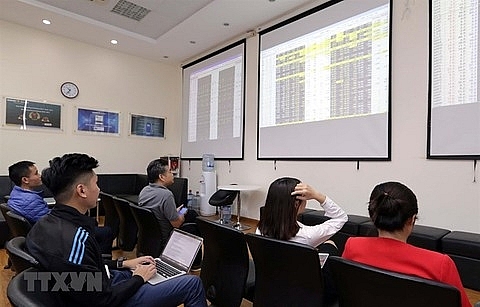PM passes securities market plan
 |
| Prime Minister Nguyen Xuan Phuc has approved a new plan that focuses on restructuring the securities market until 2025.- VNA/VNS Photo |
Under the new plan, numbered 242/QD-TTg, the Government wants to ensure comprehensive restructuring of the securities market so that it becomes the medium- and long-term capital-raising instrument for the Vietnamese economy and businesses.
The Government also wants to make the securities market a tool to help it restructure State-owned enterprises (SOEs) and divest from those companies, re-shape the country’s economic growth model, and help Viet Nam become more interactive to regional and global markets.
Several milestones have been set in the document such as the value of the stock market is projected to reach 100 per cent and 120 per cent of Viet Nam’s total gross domestic product (GDP) in 2020 and 2025, and the number of listed companies in 2020 rising 20 per cent from 2017.
The Government also plans to launch new securities products such as covered warrants, government bond futures and new index-underlying futures.
There are eight solutions proposed in the document to shake up the domestic securities market, including the perfection of the legal framework; restructuring of goods and services supply; restructuring of securities companies, market and investors; improvement of market management; and upgrading the market status based on global standards.
Among the items, restructuring of securities companies may be among the biggest concerns for the market.
Under the new project, brokerage firms are required to reform their operational models, improve their financial health, make stronger efforts in corporate and risk management, and improve corporate transparency and performance.
Any unofficial capital sources for securities firms will be monitored closely and the firms violating the market rules on margin lending will be fined more strictly.
Brokerage firms, which have capital adequacy ratio (CAR) of more than 180 per cent, capital of more than VND1 trillion and no cumulative losses, will receive support from market regulators to expand their business, lead in introducing new products and services to the market, become the founding members of the bond and derivative markets, and restructure poorly-performing securities firms.
On the other hand, companies with below 180 per cent CAR will be watched by the market regulator and are disallowed to directly manage investors’ trading money.
They are also restrained from making new investments, trading shares and paying dividends. In addition, those firms are banned from trading highly risky transactions on the market.
What the stars mean:
★ Poor ★ ★ Promising ★★★ Good ★★★★ Very good ★★★★★ Exceptional
Related Contents
Latest News
More News
- Cashless payments hit 28 times GDP in 2025 (February 04, 2026 | 18:09)
- SSIAM and DBJ launch Japan Vietnam Capital Fund (February 04, 2026 | 15:57)
- Banks target stronger profits, credit growth in 2026 (February 04, 2026 | 15:43)
- Vietnam on path to investment-grade rating (February 03, 2026 | 13:07)
- Consumer finance sector posts sharp profit growth (February 03, 2026 | 13:05)
- Insurance market building the next chapter of protection (February 02, 2026 | 11:16)
- NAB Innovation Centre underscores Vietnam’s appeal for tech investment (January 30, 2026 | 11:16)
- Vietnam strengthens public debt management with World Bank and IMF (January 30, 2026 | 11:00)
- Corporate bond market poised for stronger growth cycle (January 28, 2026 | 17:13)
- Vietnam's IPO market on recovery trajectory (January 28, 2026 | 17:04)

 Tag:
Tag:




















 Mobile Version
Mobile Version